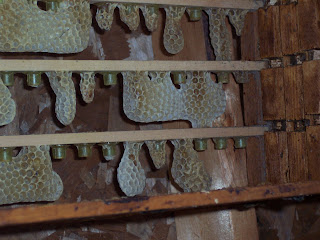 It was harvest day today.
It was harvest day today.I think I woke up around 5:00 a.m., and my first thoughts were that today we'd be taking the honey, essentially robbing our bees.
But we'd do it very nicely if I had anything to say about it.
I was far more concerned about the queen excluder that I was convinced to put in last week. You see, I needed to go through all my frames above the excluder looking for larvae to determine if the queen was above or below. This was stressing me all week. At least until I decided to remove it. If the queen had laid eggs in with the honey, I'd leave those frames until they'd hatched. She hadn't though, except a few drone cells underneath the frame - you know that space between the bottom of one frame and the top of the next where the bees love to put drone comb. Those can be easily scraped off.

Last year I noticed when brushing bees from the frames that I injured a few bees' feet. I believe I brushed too hard. So this year I focused on flicking the brush up under the bees, brushing from the bottom up, but doing it very lightly. The results were much better.
We didn't put in a bee escape first because of the queen excluder being in place so we did this with frames full of bees. Lots of glowing black eyes greeted Dad and I as we opened the hive.
The plan was to start and see how we did, knowing we had lots of bees and hadn't used the escape board. If it didn't go well, we'd put the escape in and try again in 2 days. But it went amazingly well. The bees were incredibly gentle. Not a single threatening bump or sting attempts. They are gentle bees indeed. I'm very proud of them. (I must say this queen breeder, Bill Ferguson from Ferguson Apiaries raises incredible queens. He's been participating with our provincial bee association to develop hygienic gentle queens with a tendency not to swarm. They're Buckfast queens and I really like them).
 Three supers were full of honey. We took one which was fully capped, left one that they're working on capping and I also left their first honey box that's above the brood. I did that for a couple reasons. One being that it'll create a honey barrier for the queen, another that I want to wait to extract that box until I know the bees have enough honey for themselves.
Three supers were full of honey. We took one which was fully capped, left one that they're working on capping and I also left their first honey box that's above the brood. I did that for a couple reasons. One being that it'll create a honey barrier for the queen, another that I want to wait to extract that box until I know the bees have enough honey for themselves.Last year I felt I took too much honey from one of the new nucs. They survived just fine but it was a really mild winter. I'd rather have extra honey to extract later than reach fall and not have enough to see the bees through.
You might think that I could feed the bees in fall to put weight back on the hive and I did. But last year the summer/fall weather was so cold that the bees wouldn't take the sugar syrup. I did the candy as well just to be sure.
Sorry for the lack of photos. We were pretty busy and didn't get much time to stop for them.
 We did two things which made the process much easier. Dad suggested we put an empty super with frames on top of the hive and then brush the bees off into the super. This worked marvelously. Before that the bees were piling up on top of the hive and overflowing (see the photo above with bees piled on the top frames). This gave them somewhere to go.
We did two things which made the process much easier. Dad suggested we put an empty super with frames on top of the hive and then brush the bees off into the super. This worked marvelously. Before that the bees were piling up on top of the hive and overflowing (see the photo above with bees piled on the top frames). This gave them somewhere to go.Next we used a card table. It's portable and light weight enough, yet it could hold two full supers. We set the table beside the hive and when lifting the 40+ pound super we could turn and set it down at table height--no back breaking bending. It worked very well.
We'll be back at it tomorrow, harvesting Dad's hive#2. Let's hope his bees are gentle too.








